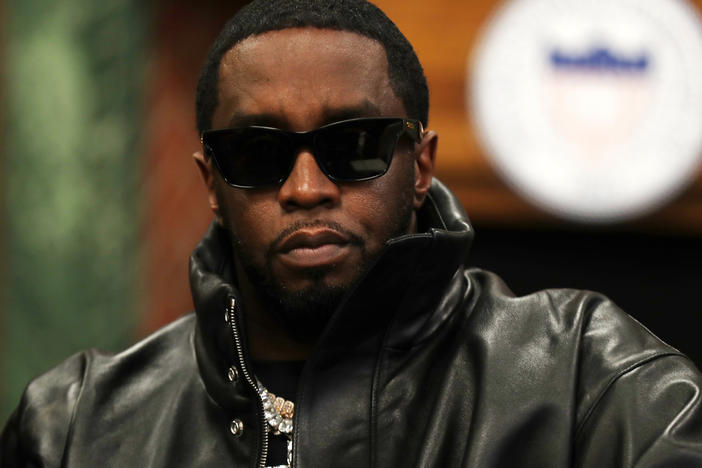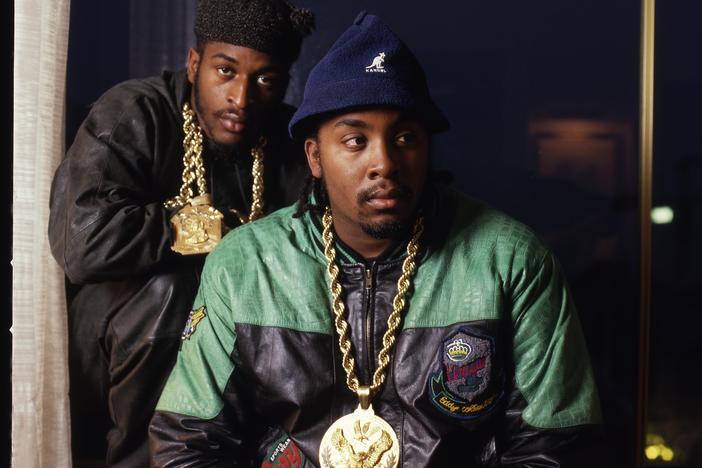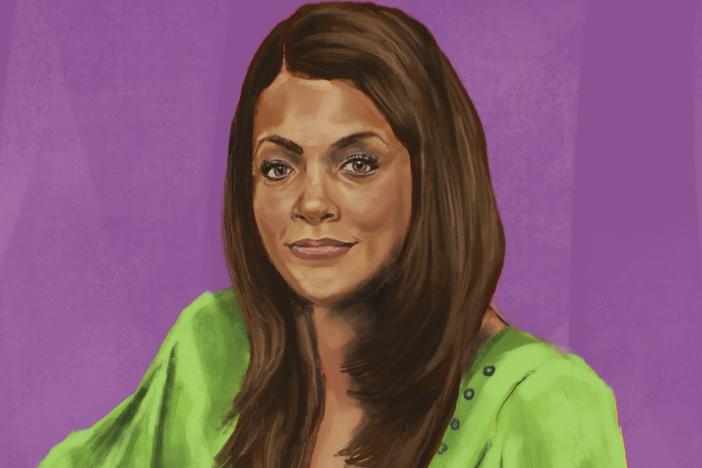Section Branding
Header Content
With A Long-Awaited Shot At Freedom, Mac Phipps Has His Eyes On The Future
Primary Content
Rodney Carmichael and Sidney Madden are the hosts of Louder Than A Riot, a new podcast from NPR Music that investigates the interconnected rise of hip-hop and mass incarceration in America.
On Feb. 22, former No Limit Records artist McKinley "Mac" Phipps appeared before the Louisiana Board of Pardons and Committee on Parole. It was a chance he'd been waiting on for two decades.
In 2001, Mac was convicted of manslaughter and sentenced to 30 years hard labor in connection to a shooting at Club Mercedes in Slidell, La. — a crime he and many others say he didn't commit.
The path to this clemency hearing started in 2018 when Mac filed an application requesting a commutation of his sentence — it was his second time filing after a 2016 clemency hearing request was denied. This January, he got an update: The hearing had been scheduled.
"I kind of just went at it like everything I do in life is like, okay, here goes nothing. Let's roll. May the chips fall where they may," Mac tells Louder Than A Riot in a new interview.
In front of five board members, 21 years and a day after his sentence began, Mac got to make his case again. The hearing had nothing to do with guilt or innocence. Justice wasn't even a factor. It was about whether, after spending half of his life in prison, Mac had earned a chance to go home.
Because of COVID-19 precautions, the hearing happened on Zoom. Mac wore his prison blues and a warden sat at a table behind him, drinking coffee. Mac's parents, Sheila and McKinley Sr., joined from Sheila's art studio in New Orleans. In a different square, Mac's wife, Angelique, looked like she was on the edge of her seat. Board members asked questions and considered the advantages and disadvantages of Mac's potential release. They acknowledged his clean disciplinary record and the many programs and classes he'd successfully completed during his incarceration.
But there were also tougher questions: about Mac's plans to return to rap; about hip-hop having "a flair for getting people in trouble;" about a photo in his file with rapper and visitor Kevin Gates showing racks of cash, which is banned inside the prison. "While it's true, you may not have done anything wrong, you were in a position where you could get in trouble for being in the wrong place at the wrong time," a board member said.
Just as Mac's lyrics were used against him in court 21 years ago, hip-hop was being criminalized again in this hearing.
But there were also surprising words of support.
"I'll state the obvious. He is not an ordinary offender. He is obviously intelligent and thoughtful," said Matthew Caplan, the current assistant district attorney who represents the same office that put Mac away all those years ago. "He is very clearly a talented musician. He's got no prior criminal record. He's got no write-ups in prison. You know, to the extent that a model offender exists, he is one."
After convening in private to discuss Mac's case, the board returned with a unanimous vote for immediate parole eligibility.
Tension visibly dissolved for Mac and his family. McKinley Sr. started to sob and Sheila held him as two decades of fear and despair melted away.
"I was actually crying tears of joy, you know, that came from my soul. At last, I couldn't believe that all of these people agreed to give my son a chance to return back to normality," Mac's dad told NPR a few days after the hearing. "Just as I cried tears for my son, I cried tears for Barron Victor too, to the kid that got killed."
For now, Mac is in a transitional work program — still incarcerated but with relaxed limitations and job training. The board's recommendation will next go before Louisiana Gov. John Bel Edwards for review. To be clear, this potential commutation isn't the same thing as Mac being exonerated: It's basically a parole hearing taking place ahead of schedule.
Now, after all requests to interview Mac were repeatedly denied by the warden of his correctional center, Louder Than A Riot was able to speak with Mac for the first time ever. In an hour-long phone interview from Mac's work facility, the 43-year-old rapper opened up about maintaining his innocence and optimism throughout his time in prison, his experiences being targeted by police during his No Limit days and plans to return to music after his release. Click here to listen to our bonus episode and hear the entire first season of Louder Than A Riot.
This interview has been condensed and edited for clarity.
Rodney Carmichael: Congratulations, first off. I don't even know if that's the right word after 20 years, but I feel like something needs to be said in terms of the hearing last week.
Mac Phipps: Oh man, I appreciate it. And it was actually 21 years and one day, to be exact.
Yeah, I remember you saying that in the hearing. Have you always been aware down to the day how long you've been in the whole time?
Unfortunately so, yeah.
What were your expectations going into this hearing? Did you feel like you had to downplay your claims of innocence in order to get this outcome?
No, no, not at all. I literally answered the questions the way I would have answered them 20 years ago. I was so nervous because ... just my family being there and over these years there have been so many disappointments. I just couldn't bear another disappointment.
You once talked about being mad at God on the day the judge handed you your 30-year sentence. How did you restore your faith and how has your relationship with God changed since the day that you received that sentence?
It's weird, because my faith is something that I rarely ever talk about, but I would say this: It was restored, like, right after that. I was upset that night. It's like one of them kids. Yeah, I threw my little fit, I'm mad with you. Then it was like, alright, I understand now. I'm cool. I always believed that the best was yet to come. I always have faith that good things are always around the corner for me.
When you say you understand, what was it that you came to understand so quickly after all of this?
One of the things that stuck out in that moment was, okay, if you were willing to accept the highs of life — I traveled the world; I did a lot of things at 22 years old that a lot of people dream of — who am I not to accept the lows? I just got to deal with it. That's basically the conclusion I drew and I rolled with it.
The hardest thing for me to understand about how you've carried this is also one of the most admirable things about you. And that's the responsibility that you've taken for the environment that led to the death of Barron Victor Jr. that night in Club Mercedes, even while maintaining your innocence. Why do you feel the need to take so much personal responsibility for how that happened and for what happened?
At the end of the day, this young man lost his life. There's a family that's grieving and many of them probably have some ill feelings towards me. Those feelings are justified because I wasn't able to prove that I didn't commit this crime in court. I tried my best, so for me this whole journey I wanted to prove to that young man [and] his family, 'Listen, I really didn't kill your son. In fact, I didn't even meet him.' For me, it was more of a personal thing, like, 'What responsibility do you have in this situation, McKinley?' is what I had to ask myself. There are some decisions that were made that I think if they were made differently, the whole sequence of events that eventually led to this young man's demise wouldn't have happened.
I don't know if you got to hear our interview with Master P, but what he had to say about your case really surprised me. You were an artist on his label and you got caught up in this tragic situation. Were you surprised when he chose to distance himself from you?
Well, I'm gonna say this. Everybody's entitled to the way they feel and he's as entitled to the way he feels as [much as] anyone else. And he had expressed to me before that he basically had a problem with me doing some of these smaller clubs he did. And, you know, that's that.
I spent a lot of time listening to your No Limit discography and in hindsight it's really not as gangsta as a lot of the music that defined that gangsta era? I hear the spirit of resistance in a lot of your music from back then, especially stuff on that second LP. Is it harder for you to embrace that music because of the way the prosecutors contorted it and twisted it and used it against you?
For a while, it had me at a point where I really couldn't listen to it. 'Cause it just brought back the trial. It brought back the way that my words were used against me and, for me, it was unfair because I think it was used because there was a lack of evidence. What really bothered me more than anything is the fact that this is hip-hop, man. This is art. I rapped about things that I've seen or sometimes I just made up stories. Because at the end of the day, this is entertainment.
Will you perform any of your No Limit-era music if fans request it in the future?
Yeah. I don't regret anything in the music I've made. I was 22 years old, you know what I mean? If I were to regret or take back some of the music I made, then I would have to take it back myself. Those things were part of me.
Did doing these last several years with Corey Miller (aka C-Murder), your friend and labelmate, make the time any easier for you?
Well, actually it was bittersweet because Corey is like a brother to me. And I've always been more concerned about his situation than mine. Because I always knew that I actually had an out date, whereas he actually has a life sentence. So I've always been more concerned about his situation than my own. Being around him, we had the opportunity to reminisce together, to talk about old times and laugh about things that happened or whatnot.
Would y'all ever talk much about how eerily similar your cases were?
Believe it or not, we didn't talk much about the cases. It was one of the things that we just understood. We knew, you know what I mean?
What did y'all understand?
We understood that we both have like traveled the same road. We both have been down the same dark roads.
Yeah. Many No Limit artists actually ended up facing a fate that led to prison time. Obviously, you and Corey Miller, the Kane & Abel brothers. Do you think that the label or even artists on the label were targeted by law enforcement?
At some point, I think we were.
Why do you say that?
I remember being stopped by some police one time and they were searching my car and they were saying something to the effect [of], "I know y'all are doing this, I know y'all are doing that. And I'll make sure we get you." And I'm just looking like, man, this is a routine traffic stop. This is crazy. You know what I mean? So I do know that at some point we were targeted. Their reason for targeting; they could probably tell you better than me.
What is most important to you at this point?Is it being free or being absolved of the crime all together?
Being free. At this point I need to be with my family. My parents are getting older. I miss them so much. I missed 21 years of my son's life. I'm faced with having to get to know him all over again [and] him getting to know me. This is a grown man that I'm going to face when I get out of here. This is not a kid. And I miss my siblings. I want to go spend time with my wife and my stepkids. Those things are probably more important to me than anything else.
How, how hard is it having to sacrifice one for the other though?
Man, I think after doing 21 years in prison, it was a no brainer. It was like, 'You want this? Or [this]? Man, I want out of jail. Now. You know what I mean?
I hear you.
You get to the point, like, uh, we only got so much time on this planet. I ain't got no more time to waste. Let's roll.
I imagine that that kind of thinking probably made it more manageable to do 20 years. I imagine if you were the other way, meaning very mad, upset, frustrated, pissed at being in this predicament and being there unjustly.
Oh I was pissed. Don't get it twisted, I was pissed. I don't ever want to undermine this and give you the impression that this was easy, you know, because it wasn't. This is not something easy to deal with, you know, but when you consider yourself a soldier, you meet ... you meet whatever the task is. And I mean, I just had ways that I had to learn how to deal with this. And those ways is what is what kept me sane throughout these years. So, you know, being optimistic and always looking for, you know, looking for the bright side, as they say, is what kept me going, You know, I promised myself that I wouldn't allow my heart to go black and I didn't want it to, I didn't want to become a bitter person. So I just made the best of it, man.
This story consists of material published within an episode of the NPR Music podcast Louder Than A Riot. It includes reporting and editing by Dustin DeSoto, Adelina Lancianese, LaTesha Harris, Theo Greenly, Will Chase, Graham Smith, Robert Little, Daoud Tyler-Ameen and Jacob Ganz.
Copyright 2021 NPR. To see more, visit https://www.npr.org.
Bottom Content




